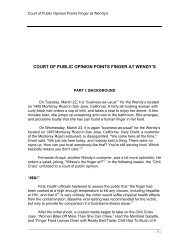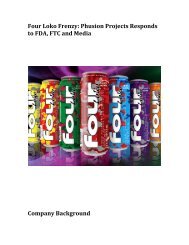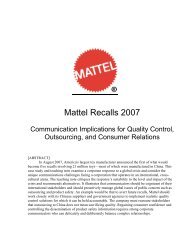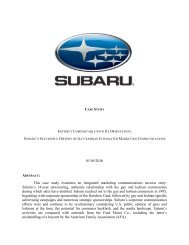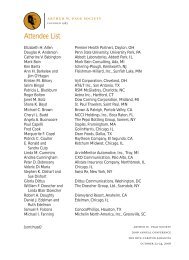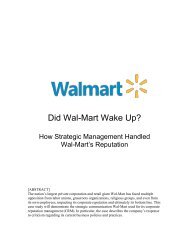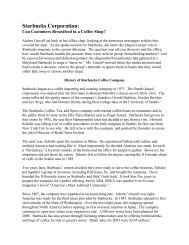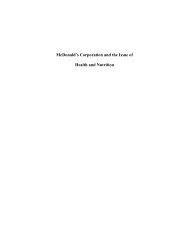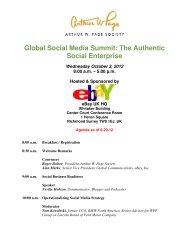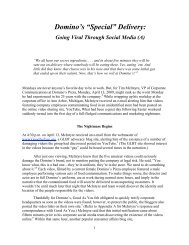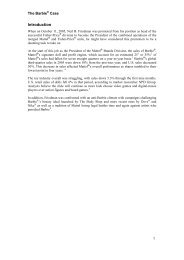The Barbie Case - The Arthur Page Society
The Barbie Case - The Arthur Page Society
The Barbie Case - The Arthur Page Society
You also want an ePaper? Increase the reach of your titles
YUMPU automatically turns print PDFs into web optimized ePapers that Google loves.
In March 2001, the Federal Trade Commission filed suit<br />
against Associates for deceptively inducing consumers to<br />
refinance existing debts into home loans with high interest<br />
rates and fees. <strong>The</strong>y also alleged that Associates tricked<br />
borrowers into purchasing high cost credit insurance without<br />
their knowledge. In some cases, the fees were included in<br />
monthly payments and added thousands of dollars in<br />
additional cost. When consumers noticed the fees, the<br />
employees of Associates employed various tactics to<br />
discourage them from removing the insurance. <strong>The</strong> FTC<br />
described the activities as, “systematic and widespread<br />
deceptive and abusing lending practices.” <strong>The</strong> result was the<br />
largest consumer protection settlement in FTC history and<br />
required Citigroup to pay $215 million. 11<br />
Helping Enron Corporation Commit Fraud<br />
On December 2, 2001, Enron filed for bankruptcy protection<br />
from its creditors. Investors later found that the company<br />
used highly complex special purpose entities and<br />
partnerships to keep $500 million off of the consolidated<br />
balance sheet and to mask significant deficiencies in cash<br />
flow. Citigroup was one of the financial institutions that<br />
helped Enron design these transactions.<br />
<strong>The</strong> Securities and Exchange Commission initiated<br />
enforcement proceedings with Citigroup for assisting Enron<br />
in producing misleading financial statements. <strong>The</strong><br />
Commission alleged that loans to Enron were disguised as<br />
commodity trades. <strong>The</strong> transactions were essentially loans<br />
because they eliminated the commodity price risk. Under<br />
these transactions, commodity price risk was passed from<br />
Enron to Citigroup and back to Enron. Without regard for<br />
the change in price of the underlying commodity, Enron was<br />
required to make repayments of principal and interest. <strong>The</strong><br />
commission also alleged that Citigroup helped Enron design<br />
transactions that transferred cash flow from financing into<br />
cash flow from operations. <strong>The</strong>re was further evidence of<br />
similar deceptive transactions with Dynegy. Citigroup agreed<br />
to pay $120 million to settle the allegations that it helped<br />
Enron and Dynegy commit fraud. 12<br />
Spinning WorldCom Executives<br />
In May 2004, Citigroup agreed to pay $2.65 billion to settle<br />
class action suits related its role in the collapse of WorldCom.<br />
Plaintiffs in the suit alleged that SSB wrongfully provided<br />
favorable ratings on the company. Telecom analyst, Jack<br />
Grubman, provided the coverage. WorldCom was not<br />
downgraded to “neutral” until WorldCom lost 90% of its<br />
value. <strong>The</strong> U.S. House of Representatives Financial Services<br />
Committee additionally found that Grubman warned<br />
arthur w. page society<br />
WorldCom executives, in advance of public disclosure, that<br />
Citigroup was dropping the stock from the recommended list. 13<br />
A former U.S. Attorney General appointed examiner alleged<br />
that Bernard Ebbers, WorldCom’s chief executive officer,<br />
violated his fiduciary duties by passing over $100 million of<br />
investment banking business to SSB in exchange for<br />
allotments of IPO stock shares. Ebbers was the chief<br />
executive during the time when massive accounting fraud<br />
and questionable personal loans were discovered. WorldCom<br />
subsequently restated earnings by $17.1 billion in 2001 and<br />
$53.1 billion in 2000. 14<br />
<strong>The</strong> End of Japanese Private Banking<br />
Citigroup is the largest and oldest foreign-owned bank in<br />
Japan. <strong>The</strong> history of their operations dates back to 1902. <strong>The</strong><br />
operations in Japan are some of the largest outside of the U.S.<br />
for Citigroup. Bank officials at Japan’s Financial Services<br />
Agency began investigating Citigroup transactions linked to<br />
money laundering, as well as loans that were used to<br />
manipulate publicly traded stocks. <strong>The</strong> FSA warned<br />
Citigroup in 2001, but little corrective action was performed.<br />
In December 2004, Citigroup was handed the damaging news<br />
that the FSA would terminate all private banking operations<br />
in Japan. This included a requirement to close over five<br />
thousand bank accounts. <strong>The</strong> FSA cited the corporate culture<br />
and governance for the infractions. Citigroup executives<br />
blamed the problem on the unclear reporting structure for<br />
key executives in Japan. Heads of divisions reported to<br />
different bosses in New York. In addition to the lost earnings,<br />
the closing of the bank accounts represents a challenging<br />
blow to Citigroup’s image in Japan and threatens the consumer<br />
and corporate banking units still operating in the country. 15<br />
Financial Effects of the Corporate Scandals<br />
By the end of 2002, the effects of the various allegations were<br />
weighing heavily on Citigroup. <strong>The</strong> SEC, FTC, NASD, the<br />
New York State Attorney General and other agencies had<br />
performed investigations. <strong>The</strong> reserves set aside for still<br />
outstanding legal liability grew by billions because of the<br />
costs of regulatory and private litigation.<br />
During 2002, the year that many of these issues were<br />
discovered, the company lost over 30% of its market value. In<br />
May 2003, Citigroup dropped coverage of 117 firms and fired<br />
seven of its top analysts. <strong>The</strong>re was an increasing number of<br />
analyst layoffs up and down Wall Street. J.P. Morgan,<br />
Goldman Sachs and Morgan Stanley cut up to 25% of their<br />
research staffs. 16<br />
37



